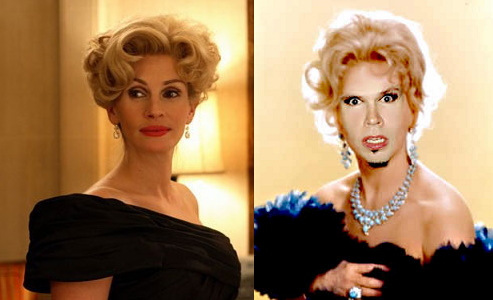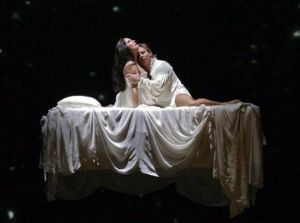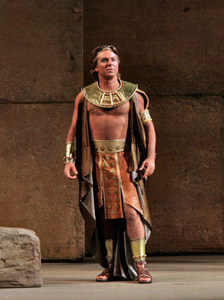Last night's season premiere of
Norma at the Met restored Bellini's opera to musical and vocal distinction but the dramatic fire was burning only fitfully.
Hasmik Papian is a hugely experienced Norma who some consider to be the best contemporary exponent of the role. But the key word here is contemporary not best. Her voice is not the conventional
soprano drammatica d'agilita (with more or less agility) that has been associated with the role in the past. Instead it is a bright, high-placed floaty soprano of medium size. The tonal quality is an intriguing and not unattractive mixture of copper and silver. Gold and platinum probably are the elements needed for this role but she wasn't dealing in base vocal metals.
However, it is a voice without a great deal of variety of tonal color and the lower middle register is weak and colorless. This meant that this druidess shone in moments of reflection, tenderness and lyricism like the "Casta diva", "Ah, rimembranza" and "Deh, non volerli vittime" but fell way short in moments of wild anger and dark threatening command. The coloratura was decent but not brilliant. Some of the tricky runs were finessed and the climactic high C's were short and hardly effortless. Vocal thrust and command were in short supply all night. Her weakest moment of the evening was the second act trio with Pollione and Adalgisa. Here Papian seemed lost and clueless as to how to make an effect. She lacks really exciting vocal attack and could not dominate the ensemble. However, Papian did stronger work in the final scenes with solid vocalism and shone in the final moving scenes of renunciation and self-sacrifice.
Papian, a slim shapely woman who was sporting three newly designed and created gowns in blue crushed silk, russet velvet and scarlet velvet with gold accents was an unusually youthful and feminine Norma. One wondered what Pollione and the Gauls were intimidated by. Her anger came across more as agitated distress and her threats seemed mere sarcastic insinuation. The real emotional depths of the part seemed sketched in skilfully but not fully plumbed.
This was contrasted against the heroic yet vulnerable Adalgisa of
Dolora Zajick who had the attack and vocal breadth but also depth of feeling and variety of color as the junior priestess. I think in the 19th century Zajick would have been a Norma with whatever adjustments to the vocal line were needed for her comfort and endurance in the role. Zajick showed herself a mistress of vocal coloration and dynamic control. Like Cossotto she removed a lot of the steel and chest coloration from her tone and sang Adalgisa with gentle purity to suggest a virginal, innocent and youthful woman. The soprano-like tone did not preclude power and richness when appropriate but informed the tonal palette - she most often chose to end phrases piano rather than forte and didn't slam into low notes. She performed a flawless messa di voce on "Io l'obbliai" and also managed a pianissimo high C in the second act. Dolora had the grandeur both vocal and physical that Papian lacked.
Franco Farina is a confounding artist, seemingly a Jekyll and Hyde vocalist. A superb musician with excellent technical control in lyrical legato lines and piano singing, he devolves into a braying, wobbling, unmusical shouter when he attempts robusto heroics. At times it seems that a
Pertile or
Bergonzi are within him fighting for his soul against
Baum and
Mauro. The whining, blown-out upper middle tones were contrasted against a firm, bright and expert shaped line in cantilena. He managed a superb piano tone in the duet with Adalgisa and when striving for line and style was really impressive. But here or there a loosening tone or shouted high note would intrude and remind you of his dark side. The costume suited him and he worked well with both ladies.
Vitalij Kowaljow poured on rich velvet tones in the musically rich but dramatically uninteresting role of Oroveso.
Juliana di Giacomo gave notice of a major soprano voice in the small role of Clotilde in her Met debut. The two boys playing Norma's children were given more specific direction including reaching out for their mother in the last scene with moving results.
I happened to like the conducting of
Maurizio Benini who stressed the dramatic weight and symphonic qualities of the score while not slighting elegance and forward movement. This score too often has fallen into the hands of routiniers and this was a step in the right direction.
I won't devote much space to
John Copley's production and
John Conklin's sets because they don't deserve it.
Norma is an opera that seems to confound modern directors. Why Norma decorated her house with wooden crates painted black is not something this inquiring mind wanted to know. Sometimes it looked like a high school production of Shakespeare's
Macbeth or a minimalist
Camelot.
Laurie Feldman who staged this revival attempted some creative choral movement but it was pretty much park and bark. Despite the cheapo minimalist look they might as well have been singing in front of musty old drops of Stonehenge and paper maché rocks.
After the dismal last two outings with a way past-it
Renata Scotto (please no historical revisionism here - she could not sing the role by the time she got to the Met) and a never-really-had-it lumpen
Jane Eaglen, last night restored Bellini's opera to musical respectability. One could get a sense of its greatness, particularly when Zajick was center stage. But the real fire and ice was last seen with
Caballé in 1976 and we are still awaiting her successor. --
Gualtier Maldè
Labels: gualtier malde, met



 Of course, cher public, you heard it about it here a
Of course, cher public, you heard it about it here a  So, was
So, was 










